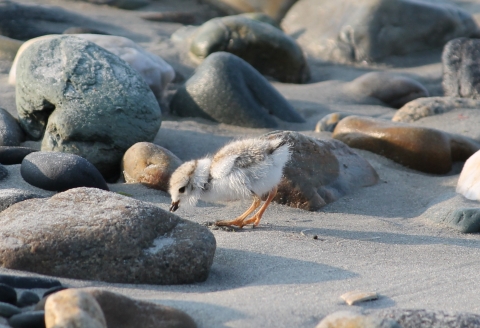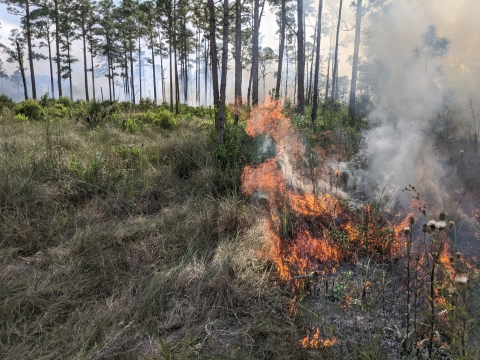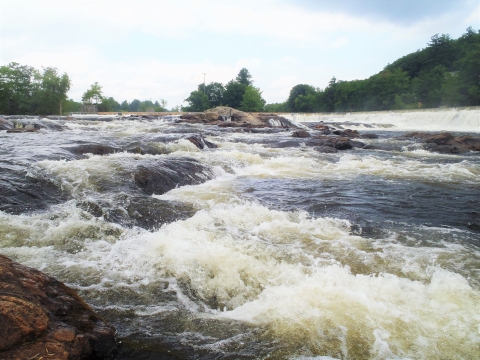What We Do
With a service area focused on the New England area, NEFO field office staff coordinate with federal, tribal, state, local, and private partners to carry out the U.S. Fish and Wildlife Service's (Service) mission. Through implementation of the laws and regulations that direct our work and collaboration with our partners we work to:
Recover federally endangered and threatened species, conserve at-risk species, and support research
- Compile and analyze data for decisions regarding which plants and animals receive Endangered Species Act protection
- Collaborate with partners to create recovery strategies, identify opportunities to implement recovery actions, locate funding, secure permits if necessary, and monitor progress
- Contribute to proactive conservation of at-risk species
- Identify factors that may influence species viability and develop strategies and best management practices to reduce impacts
- Investigate and quantify impacts to species from project activities, environmental factors, climate change climate change
Climate change includes both global warming driven by human-induced emissions of greenhouse gases and the resulting large-scale shifts in weather patterns. Though there have been previous periods of climatic change, since the mid-20th century humans have had an unprecedented impact on Earth's climate system and caused change on a global scale.
Learn more about climate change , hazardous substance releases, and oil discharges, etc.
Review Projects and Provide Technical Assistance
- Help federal agencies identify and address negative plant, fish, and wildlife impacts from projects they fund or authorize
- Provide technical assistance to non-federal partners
- Minimize the impacts hydropower dams have on migratory fish, federally protected species, and other riverine fish and wildlife resources
Habitat Restoration and Management
- Restore degraded streams, wetlands, and aquatic connectivity - this includes identifying and eliminating sources of sediment, removing stream barriers such as decrepit dams, or controlling invasive exotic plants that threaten the integrity of a wetland
- Encourage the development of pollinator habitat wherever appropriate
- Work with private landowners to complete habitat restoration and species conservation on private lands
- Fund restoration projects in upland areas in support of species recovery
- Respond to spills and assess impacts from oil and hazardous substance releases and discharges
Connect People to Nature
- Provide opportunities for students to interact with nature and gain a better understanding of local species and habitats
- Identify opportunities to enhance recreational and educational opportunities following natural resource settlements
Our Programs
Endangered Species
The Service is the lead federal agency for administering the Endangered Species Act of 1973 for land and freshwater species. The NEFO Endangered Species team works in the states of Connecticut, Massachusetts, New Hampshire, Rhode Island, and Vermont to promote the recovery of federally listed endangered and threatened species and conservation of at-risk species. We provide biological and regulatory technical assistance to federal agencies through project review and ESA section 7 consultation, and assist non-federal entities through technical assistance regarding activities that may affect imperiled species.
For additional information regarding the New England Field Office's ESA section 7 consultation process, visit this page: Endangered Species Act Project Review
Partners for Fish and Wildlife
The Partners for Fish and Wildlife Program provides technical, financial, and project implementation assistance to landowners and other conservation partners to voluntarily restore and enhance fish and wildlife habitats on their land. Habitat restoration priorities for the Partners for Fish and Wildlife Program in New England target trust resources such as listed fish and wildlife species and at-risk species. The NEFO Partners program has prioritized restoring the following habitats: Upland Habitats, Coastal and Freshwater Wetland Habitats, River Habitats, and Schoolyard Habitats.
FERC Hydropower
NEFO staff provides technical evaluations on the effects of hydroelectric power projects to fish and wildlife resources. Federal Energy Regulatory Commission (FERC) regulations, as authorized by the Federal Power Act, and the Fish and Wildlife Coordination Act, require license applicants and licensees to consult with the Service prior to and after project licensing. Our staff biologists provide FERC with recommendations for the protection of fish and wildlife resources for licensed and exempted projects, mandatory prescriptions for fish passages, and terms and conditions to provide for the protection and utilization of Service lands upon which proposed hydropower projects may be located.
Environmental Response and Restoration
The NEFO Environmental Response and Restoration program responds to oil and hazardous substance releases and discharges, assesses damages from these events, and works to restore fish and wildlife and their supporting habitats that were adversely impacted. Through partnerships with organizations, our staff works to identify, investigate, and quantify contaminant impacts to fish and wildlife.
Our Services
Explore the links below to learn more about some of the services we offer to support plant, fish, and wildlife conservation with a special focus on imperiled species. Check back as we add more services to our national database!
Laws and Regulations
Under several federal laws, Congress has directed the U.S. Fish and Wildlife Service to be stewards of our nation's plant, fish, and wildlife resources - particularly animals that cross state and even international borders; threatened and endangered species; and the National Wildlife Refuge system - the system of federal lands dedicated to wildlife conservation. Congress has similarly directed the Fish and Wildlife Service to work with other federal agencies to minimize or eliminate negative impacts to plants, fishes, and wildlife from projects they fund or authorize. Learn more about the laws that direct our work.





